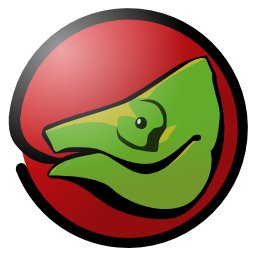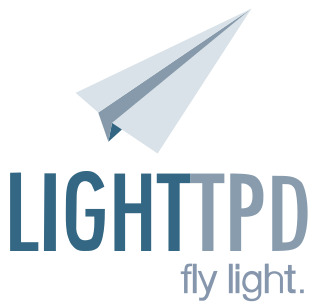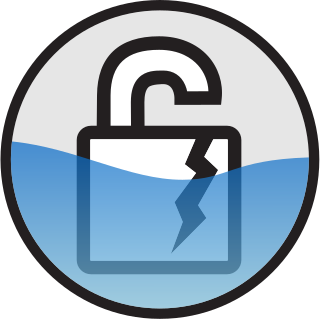
Hypertext Transfer Protocol Secure (HTTPS) is an extension of the Hypertext Transfer Protocol (HTTP). It uses encryption for secure communication over a computer network, and is widely used on the Internet. In HTTPS, the communication protocol is encrypted using Transport Layer Security (TLS) or, formerly, Secure Sockets Layer (SSL). The protocol is therefore also referred to as HTTP over TLS, or HTTP over SSL.

Konqueror is a free and open-source web browser and file manager that provides web access and file-viewer functionality for file systems. It forms a core part of the KDE Software Compilation. Developed by volunteers, Konqueror can run on most Unix-like operating systems. The KDE community licenses and distributes Konqueror under GNU GPL-2.0-or-later.

K-Meleon is a free and open-source, lightweight web browser for Microsoft Windows operating systems. Unlike cross-platform browsers, it uses the native Windows API to create its user interface. Early versions of K-Meleon render web pages with Gecko, Mozilla's browser layout engine, which Mozilla's browser Firefox and its email client Thunderbird also use. K-Meleon became a popular Windows browser and was available as an optional default browser in Europe via BrowserChoice.eu. K-Meleon continued to use Gecko for several years after Mozilla deprecated embedding it. Current versions of K-Meleon use the Goanna layout engine, a fork of Gecko created for the browser Pale Moon.

Mac OS X Server is a discontinued series of Unix-like server operating systems developed by Apple Inc. based on macOS. It provided server functionality and system administration tools, and tools to manage both macOS-based computers and iOS-based devices, network services such as a mail transfer agent, AFP and SMB servers, an LDAP server, and a domain name server, as well as server applications including a Web server, database, and calendar server.

QNX is a commercial Unix-like real-time operating system, aimed primarily at the embedded systems market.

In computer networking, a proxy server is a server application that acts as an intermediary between a client requesting a resource and the server providing that resource. It improves privacy, security, and performance in the process.
Transport Layer Security (TLS) is a cryptographic protocol designed to provide communications security over a computer network. The protocol is widely used in applications such as email, instant messaging, and voice over IP, but its use in securing HTTPS remains the most publicly visible.

OpenSSL is a software library for applications that provide secure communications over computer networks against eavesdropping, and identify the party at the other end. It is widely used by Internet servers, including the majority of HTTPS websites.
OpenVPN is a virtual private network (VPN) system that implements techniques to create secure point-to-point or site-to-site connections in routed or bridged configurations and remote access facilities. It implements both client and server applications.
The Online Certificate Status Protocol (OCSP) is an Internet protocol used for obtaining the revocation status of an X.509 digital certificate. It is described in RFC 6960 and is on the Internet standards track. It was created as an alternative to certificate revocation lists (CRL), specifically addressing certain problems associated with using CRLs in a public key infrastructure (PKI). Messages communicated via OCSP are encoded in ASN.1 and are usually communicated over HTTP. The "request/response" nature of these messages leads to OCSP servers being termed OCSP responders.

lighttpd is an open-source web server optimized for speed-critical environments while remaining standards-compliant, secure and flexible. It was originally written by Jan Kneschke as a proof-of-concept of the c10k problem – how to handle 10,000 connections in parallel on one server, but has gained worldwide popularity. Its name is a portmanteau of "light" and "httpd".
Web server software allows computers to act as web servers. The first web servers supported only static files, such as HTML, but now they commonly allow embedding of server side applications.

Network Security Services (NSS) is a collection of cryptographic computer libraries designed to support cross-platform development of security-enabled client and server applications with optional support for hardware TLS/SSL acceleration on the server side and hardware smart cards on the client side. NSS provides a complete open-source implementation of cryptographic libraries supporting Transport Layer Security (TLS) / Secure Sockets Layer (SSL) and S/MIME. NSS releases prior to version 3.14 are tri-licensed under the Mozilla Public License 1.1, the GNU General Public License, and the GNU Lesser General Public License. Since release 3.14, NSS releases are licensed under GPL-compatible Mozilla Public License 2.0.
Nginx is a web server that can also be used as a reverse proxy, load balancer, mail proxy and HTTP cache. The software was created by Igor Sysoev and publicly released in 2004. Nginx is free and open-source software, released under the terms of the 2-clause BSD license. A large fraction of web servers use Nginx, often as a load balancer.
An embedded database system is a database management system (DBMS) which is tightly integrated with an application software; it is embedded in the application. It is a broad technology category that includes:
Zarafa was an open-source groupware application that originated in the city of Delft in the Netherlands. The company that developed Zarafa, previously known as Connectux, is also called Zarafa. The Zarafa groupware provided email storage on the server side and offered its own Ajax-based mail client called WebAccess and a HTML5-based, WebApp. Advanced features were available in commercially supported versions. Zarafa has been superseded by Kopano.

Cherokee is an open-source cross-platform web server that runs on Linux, BSD variants, Solaris, OS X, and Windows. It is a lightweight, high-performance web server/reverse proxy licensed under the GNU General Public License. Its goal is to be fast and fully functional yet still light. Major features of Cherokee include a graphical administration interface named cherokee-admin, and a modular light-weight design.

Packet Sender is an open source utility to allow sending and receiving TCP and UDP packets. It also supports TCP connections using SSL, intense traffic generation, HTTP(S) GET/POST requests, and panel generation. It is available for Windows, Mac, and Linux. It is licensed GNU General Public License v2 and is free software. Packet Sender's web site says "It's designed to be very easy to use while still providing enough features for power users to do what they need.".

The DROWN attack is a cross-protocol security bug that attacks servers supporting modern SSLv3/TLS protocol suites by using their support for the obsolete, insecure, SSL v2 protocol to leverage an attack on connections using up-to-date protocols that would otherwise be secure. DROWN can affect all types of servers that offer services encrypted with SSLv3/TLS yet still support SSLv2, provided they share the same public key credentials between the two protocols. Additionally, if the same public key certificate is used on a different server that supports SSLv2, the TLS server is also vulnerable due to the SSLv2 server leaking key information that can be used against the TLS server.
Kopano is an open-source groupware application suite originally based on Zarafa. The initial version of Kopano Core (KC) was forked from the then-current release of Zarafa Collaboration Platform, and superseded ZCP in terms of lineage as ZCP switched to maintenance mode with patches flowing from KC. Kopano WebApp similarly descended from Zarafa WebApp. Since October 2017, Kopano Core is also known more specifically as Kopano Groupware Core, since Kopano B.V. developed more products that were not directly requiring groupware components.










